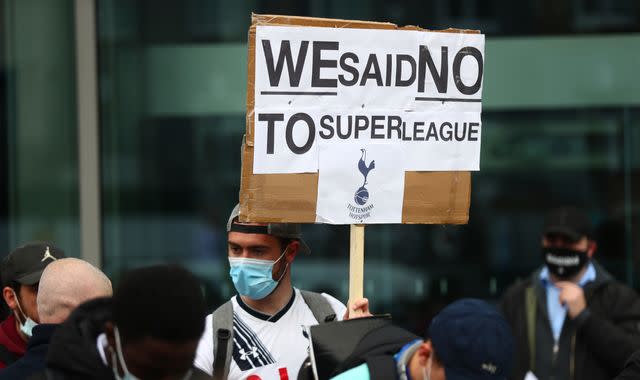How would the new European Super League work - and what does it mean for Premier League clubs?

Hopes of a new European Super League have been reignited by the European Court of Justice's ruling that FIFA and UEFA have no right to block it.
The ECJ ruled on Thursday that the two regulatory bodies acted in breach of European competition law when they put a stop to the original plans in 2021.
FIFA and UEFA also "abused their dominant position in football" by threatening to sanction teams who took part, the judges said.
A22 Sports Management, the company behind proposals for the league, has now relaunched its bid, claiming they have addressed widespread criticism of their initial proposals.
Here, Sky News looks at how the competition would work under the new plans.
Why is a super league being proposed?
In 2021, A22 Sports launched a bid for a new 12-team European Super League, including the Premier League's so-called big six - Manchester United, Manchester City, Liverpool, Tottenham, Arsenal and Chelsea.
It sparked a huge backlash, with UEFA, FIFA, domestic teams and fans warning it would focus solely on the richest clubs - damaging grassroots and lower league football for financial gain.
While existing European competitions such as the Champions League require clubs to qualify through domestic league placings each year, under the old ESL plan, the participation - and associated revenue - would have been guaranteed indefinitely for the biggest clubs in Europe.
They would have also played more games against elite European rivals, and would no longer have had to share TV revenue with the smaller clubs who compete in existing European competitions.
Read more:
Analysis: UK watchdog could be good for smaller clubs
Man charged over fireworks at Man Utd protest
A22 Sports says the new plans "free football from the monopoly of UEFA", are "more open", "based on merit", and offer the chance of progression, relegation, and the free viewing of all live matches.
It also claims both the original and tweaked proposals are in response to the many "inconsequential matches" played in domestic and European leagues currently that are "not grabbing fans' interest" based on viewing figures.
How would it work?
The new ESL plan involves a men's and a women's competition.
Men's game
Within the men's competition, there would be three leagues - blue, gold and star - with blue at the bottom and star at the top.
It would feature 64 clubs in total, with the blue league compromising 32, and the star and gold leagues 16 each. Each league would be split into groups of eight.
The overall competition would consist of two rounds - the league and knockout stages.
The league stage would take place between September and April, with each team competing in 14 matches - seven at home and seven away.
A22 Sports claims that this model ensures "every match counts" and would not clash with domestic league schedules.
Once these have been played, the four clubs with the best results in both the star and gold leagues would qualify for the knockout stage, along with the two top-performing teams from the blue league.
Quarter and semi-finals would be two-legged - with one home and one away match.
The final would be played on neutral ground - with the winners of each crowned the champions of their leagues.
To counter criticism the previous plans were uncompetitive and offered no progression, the bottom two teams of both the star and the gold league would be relegated and replaced by the top two teams in the league below.
Twenty of the 32 clubs in the blue league would exit the competition in favour of ones identified as strong performers in their domestic leagues.
A22 said matches would be available to watch for free on one platform, with revenue coming from advertising.
Women's game
The model for the women's competition is "very similar", A22 Sports claims, but is "adapted to the current stage of the development of the women's game".
It also says it would "double the amount of showcased European women's football clubs".
Instead of three leagues, there would be two - star and gold - comprising 32 clubs in total.
Each league would have 16 teams divided into groups of eight.
Similarly to the men's competition, the league stage would see each club play 14 matches ahead of the knockout round.
Quarter and semi-finals would also be two-legged and the winners crowned top of their respective leagues.
The two worst-performing teams in the star league would be relegated and replaced by the top two in the gold league, while the four bottom in the gold league replaced with others from domestic leagues.
A22 Sports says this will "ensure mobility in and across leagues".
What do the latest developments mean for British clubs?
The UK government reacted to the initial plans by forming an independent regulatory body that would prevent clubs from joining breakaway leagues like the ESL.
Responding to the court ruling and newly unveiled plans, the Department for Digital, Culture, Media and Sport said it was now bringing forward legislation to ensure this happens,
In addition, because the UK is no longer a member of the European Union, clubs in the country would not be able to appeal against this to the European Court of Justice.
This means that even if the new ESL goes ahead, British clubs will likely be prevented from taking part.
Arsenal, Chelsea, Manchester City, Manchester United, Tottenham Hotspur and Liverpool were the Premier League clubs in the previous Super League proposal.
Manchester United, Atletico Madrid and Bayern Munich - the second of which had also been part of the original Super League plan - expressed support for UEFA in the wake of the developments on Thursday.


